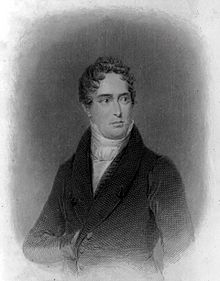Alexander Hill Everett
| Alexander Hill Everett | |
|---|---|
 |
|
| 8th United States chargé d'affaires in the Netherlands | |
|
In office January 4, 1819 – June 7, 1824 |
|
| Appointed by | James Monroe |
| Preceded by | William Eustis |
| Succeeded by | Christopher Hughes |
| 11th United States Ambassador to Spain | |
|
In office September 4, 1825 – August 1, 1829 |
|
| Appointed by | John Quincy Adams |
| Preceded by | Hugh Nelson |
| Succeeded by | Cornelius P. Van Ness |
| 2nd United States Commissioner to the Great Qing Empire | |
|
In office July 4, 1845 – June 28, 1847 |
|
| Appointed by | James K. Polk |
| Preceded by | Caleb Cushing |
| Succeeded by | John Wesley Davis |
| Personal details | |
| Born |
March 19, 1790 Boston, Massachusetts, United States |
| Died | June 29, 1847 (aged 57) Guangzhou, China |
| Nationality | American |
| Political party | Republican, Democrat |
| Spouse(s) | Lucretia Orne Peabody (1786-1862) |
| Relations | Brother of Edward Everett |
| Alma mater | Harvard College |
| Profession | Lawyer, editor, diplomat, author |
Alexander Hill Everett (March 19, 1792 – June 28, 1847) was an American diplomatist, politician, and Boston man of letters. Everett held diplomatic posts in the Netherlands, Spain, Cuba, and China. His translations of European literature, published in the North American Review, were influential for the Transcendentalism movement.
Everett was born in Boston, Massachusetts to Lucy Hill and Oliver Everett, who was at that time the minister of the New South Church. The Everetts were a prominent Massachusetts family: through his father, Alexander was a descendent of Richard Everett (1597 – 1682), one of the earliest settlers of Dedham, Massachusetts. Alexander's younger brother, Edward Everett, would go on to serve as the 15th Governor of Massachusetts and Secretary of State. In 1806, Alexander graduated from Harvard College in 1806, the youngest and best in his class. After leaving College he was an assistant teacher in Phillips Exeter Academy for one year, then studied law in the office of John Quincy Adams. In 1809 he accompanied Adams to Russia, where he lived for two years as Adam's personal secretary in the legation.
At the close of the War of 1812, Governor of Massachusetts William Eustis was appointed minister to the Netherlands, and Everett accompanied him as secretary of legation, but after a year of service returned home. On the retirement of Governor Eustis from the legation, however, Everett was appointed his successor, with the rank of chargé d'affaires to The Hague, which post he held from 1818 till 1824. Everett used his time to write a book on European affairs, published in 1821 as Europe; or, A General Survey of the Present Situation of the Principal Powers; with Conjectures on Their Future Prospects. In it Everett described the Netherlands as "a decayed and decaying nation" whose creation had been an error and predicted that it would eventually disappear in the sea. After Adams became president in 1825, he appointed Everett minister to Spain, from 1825–1829.
...
Wikipedia
